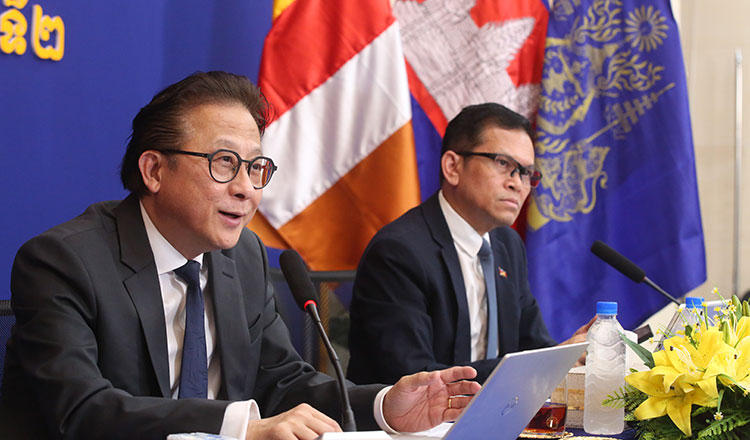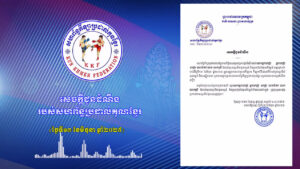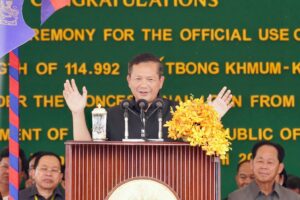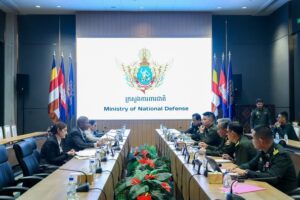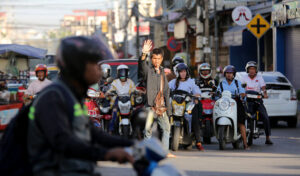New government’s six-month report card is unveiled
The new administration of Prime Minister Hun Manet has achieved great success in carrying out its work at home and abroad over the past six months, the Government Spokesperson’s Unit said on Friday.
Unveiling the six-month report card of the government, Government Spokesman Pen Bona said that the six priority task objectives set by the government through its Pentagonal Strategy has started yielding results.
The six priority tasks include expanding healthcare services for people throughout the country, vocational training for young people from poor families, social assistance programmes, development of national strategies, support for informal economy and the establishment of financial assistance programmes for farmers via the deployment of agricultural officials in communes across the country.
Bona said that the expansion of healthcare services to people across the country through the Health Equity Fund and National Social Security Fund (NSSF) is ongoing. This work now is carried out actively by the Ministry of Health and related ministries, which have made substantial progress.
“As of the beginning of 2024, nearly seven million people, or 40% of the total population, have benefited from this policy programme,” he said.
“With vocational training available for 1.5 million young people from poor families, so far nearly 30,000 people have registered for the priority policy programme. The Ministry of Labour and Vocational Training and other stakeholders are actively working on this,” he said.
Bona added that the government is implementing the National Social Assistance Programme, a key policy objective that is divided into two categories, including family assistance and emergency social protection.
Social assistance programmes for families include cash support for pregnant women and children under the age of two, scholarships for poor primary and secondary students and cash support for the disabled and the elderly people over the age of 60.
Social protections are in place to respond to emergencies, including natural disasters, public health crises and financial crises.
He said the government is working actively to establish legal frameworks and management systems for developing a national strategy to benefit the informal economy.
The government has also put in place a mechanism to coordinate delivery of financial stimulus to help farmers. The government is earmarking $100 million and if necessary, more will be allocated to help farmers maintain food security.
In addition, the government has recruited 250 commune agricultural officials for deployment in the target provinces.
Currently, the Ministry of Agriculture is identifying 800 additional communes, which are designated for the second phase of the project commencing in April.
According to Bona, the other achievements of the government involve its conduct of proactive judicial reforms with the aim to ensure justice for all citizens and victims. He added that the government has reformed the recruitment of civil servants and strengthened the management of civil service institutions.
In the land sector, the government is ending land disputes by actively surveying and issuing land titles to citizens. In the field of security, the Ministry of Interior has cracked down on crime, including gambling, drug-trafficking and other illegal activities.
Minister Delegate attached to the Prime Minister Jean François Tan, who was also present at the press conference, said that the government is focusing on economic cooperation and, as a peace-loving country, working to counter war on the international stage.
He said that Mr Hun Manet has boosted diplomatic ties abroad, such as attending the 43rd ASEAN Summit in Indonesia, paying an official visit to China and attending the 78th United Nations General Assembly in the United States.
The Prime Minister has participated in the 3rd Belt and Road Forum in China and joined the ASEAN Summit – Gulf Cooperation Council in Saudi Arabia.
In addition, Mr Hun Manet paid an official visit to Vietnam to attend the 50th Anniversary of ASEAN-Japan Friendship and Cooperation Summit in Tokyo, and attended the World Economic Forum in Davos, Switzerland.
Besides, he has paid an official visit to France and Thailand.
Tan also shed light on Mr Hun Manet’s difference in foreign diplomacy in the first three months and the past three months.
For the first three months, he was very engaged with foreign relations due to the many international forums that as the head of the new head of government,he was required to attend. In fact, the Prime Minister was familiarising with the world leaders in the first three months.
During the last three months of diplomacy, Mr Hun Manet has developed a clear and more important goal: to strengthen bilateral relations and take advantage of opportunities to develop the economy, in particular through official visits to China, France, Vietnam and Thailand.
He said that the official visit to Thailand was intended to elevate the relationship to a strategic partnership between Thailand and Cambodia. The meeting led to setting up a joint working group to establish Cambodia-Thailand trade links for electric vehicles and electronic equipment – among others.
Yang Peou, Secretary General of the Royal Academy of Cambodia, said that the commitment to fulfill the new policy of Mr Hun Manet is clear, energetic and sharp, which is leading the new government to work well according to its best good will.
“The government’s actions will bring Cambodia closer to its goal of becoming a middle-income country by 2030 and a high-income country by 2050,” he said.

